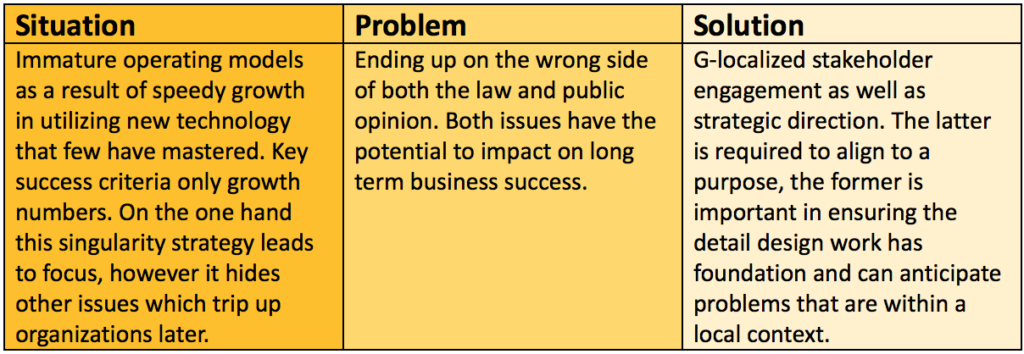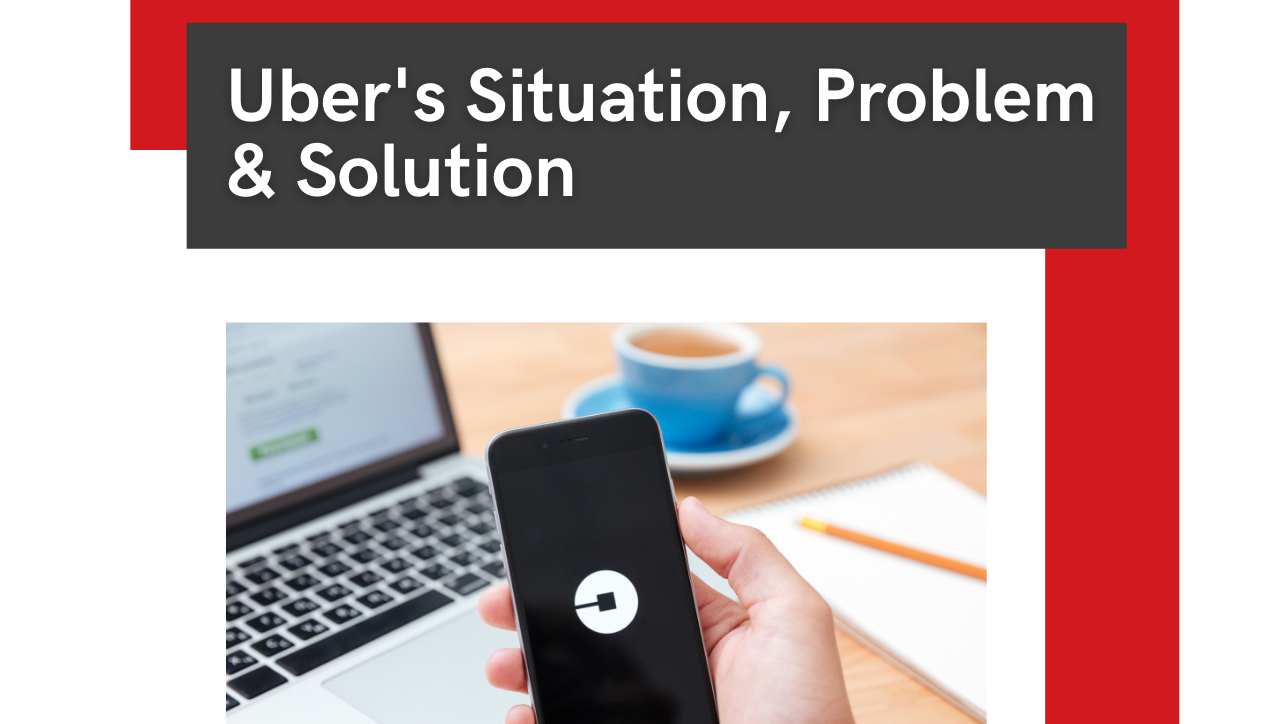
Situation
In the past, Uber hit the buffers in the UK’s capital city London. The regular TFL (Transport for London) refused to renew its license to operate. One of the interesting things about this situation is not its uniqueness; it’s actually the similarity compared to other technology ‘disruptors’ such as Amazon, Airbnb and Deliveroo. All of these organizations used a strategy of shock and speed leveraging large capital reserves to create the market conditions for them to dominate. However, in doing so they found themselves on the wrong side of regulators in one way or another. There is a continued tension being played out between the new shiny technologies we all enjoy and the legal environment that we all live within.
No one can deny the success of the tech companies. They are revolutionizing the way we experience life at a pace never before seen in human history. Although, let’s not kid ourselves; in terms of profit creation you require vast amount of capital and a long timescale to recreate their success. It’s one of the reasons they are successful. They were playing a longer game than people realized to create profit through monopoly and market domination. Many more reasons exist for their continued success and, as such, a short blog piece cannot do it justice. However, what we can cover briefly is their approach to organization design, the problems it creates, and how we’d do things differently at OTM in order to create the same level of success without the proverbial hangover that Uber is now experiencing.
Problem
Amazon recently entered the brick-and-mortar game by purchasing Whole Foods, recognizing that the highly competitive USA retail grocery market needed more than an online presence to challenge the existing players. It seems that the majority of the buying public want to visit a store and physically purchase their goods… for now, at least.
Uber, on the other hand, is relatively new to the game. They’re still leveraging other people’s resources (their cars, drivers, roads, mapping technology etc.) in order to maintain their grip on the market that they are now dominating in many cities. However, both of these companies have a problem in that eventually the regulators catch up with them. Uber has a particular problem in London and in many other cities because the main opposition are traditional and very well organized through Trades Unions or Trade Associations.
This issue makes Uber’s current situation political as well as strategic and operational.
The latter two are logical, while the former is very often not. It requires local skills, knowledge and, critically, connectivity to the power makers to sustain the business model.
If you want to be successful in a highly political environment, then at some point, you’ll have to do some serious stakeholder management. At OTM we talk about pay now or pay later. For Uber, they selected the pay later option — and it’s getting messy and expensive for them not just in London, but around the world. They have a homogenous operating model as a result of the technology they use across their entire network. However, the simplicity comes at a cost. They do not have the type of local infrastructure that a global company would have. And, critically, because of the speed at which they have grown, they have not built the types of relationships you would expect with a global player. For example, local sponsorship of good causes, and corporate social responsibility activities such as supporting local schools.
How Uber runs its business cannot be homogenous in this context. Let’s face it — where you operate within regulated environments (like transporting people), it’s somewhat shortsighted to think in these terms. Uber is finding this to their cost time and time again across the world. The advantage they have currently: their funding arrangements remain based on venture capital; therefore, they do not have to satisfy the markets… yet. But we all know that venture capital arrangements are based the ability of the investors to gain rewards through selling of shares when the organization has reached a stage where it is valuable enough for an IPO. While it might look like Uber has blank checks to play with, they’re time-limited and come with strings that need to be paid for at some point. Legal problems frighten off potential investors.
Solution
At OTM, we understand that it doesn’t matter what technology you use as the vehicle to deliver your services. The way you design your operating model relies on solid understanding of the environment. This means local knowledge as well as global in order to design-in variations occurring in different regions of the world. For example, Europe is not a single legal environment, it is actually 28… so, if you want to run a business in each member country, you’d better understand the variations between them. It’s therefore an absolute imperative that companies recognize the need to be local and operate within local parameters as well as having a global strategy. Not only does it matter for the bottom line; it also matters in terms of the company’s overall value and the investor’s ability to gain rewards back longer-term.
Key Messages
So, in looking at the Uber case, what advice would OTM offer a similar company looking to expand into a new market?
- Have a global design strategic vision that assumes there will be local variations. Ensure it builds these into the plan and aligns to a single organizational purpose. Deliberately design for ‘Glocal’, and don’t expect a Global design to absorb local work without some pain.
- For each regional variant, create a satellite team. Or, at the very least, one person with responsibility to develop stakeholder relations and feedback potential issues before they end up in the press.
- Test your assumptions through using a tried and tested system OD model such as the OTM Star Model with genuine stakeholder involvement and input, many issues and problems can be easily identified long before they become a headache. OTM Wisdom: Pay now rather than pay later.
Stuart Wigham was a Content Manager and Consultant at ON THE MARK. OTM’s experience and passion for collaborative business transformation that’s supported by pragmatism, systems thinking, and a belief in people is unparalleled. OTM has been in business for 27 years and is a global leader in organization design consulting.


